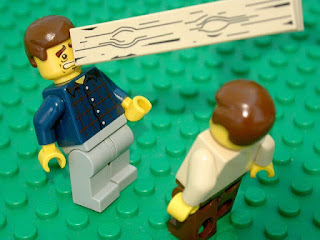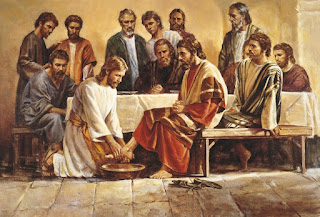Greetings in the name of Father, Son, and Holy Spirit.
“Do not judge others, and you will not be judged. For you will be treated as you treat others. The standard you use in judging is the standard by which you will be judged. (Matthew 7:1-2)
After Jesus taught about money and possessions, He started teaching the Godly relationship between fellow humans.
Let’s look into us. What do we do well, and are doing all the time? We compare us with others. If we are alone on earth or just two like Adam and Eve, we would not compare ourselves with others. However, there are many people around us. As matter of fact, each of us is just one of seven billion humans living on earth. The population during the time of Jesus was far less than now, but they were not much different from us: comparing oneself with others.
Why? It is our pride: a part of our human naure. For example, 94% of college professors believe that their teaching skills are above average. A survey of high-school students found that 70% described themselves as above average leaders. These are incorrect perceptions. These phenomenon is not limited to the professors and the students in the surveys. As we all know, each one of us is engaged in this egotistical self-deception. That is, we all suffer from this illusory superiority: a cognitive bias whereby a person overestimates his or her own qualities and abilities, in relation to the same qualities and abilities of other persons. As a result, we believe we are better than others. However, in reality, we are at most as good as others, or often even worse than others. This is a just manifestation of our egoistic pride.
This sinful trait is not easily confined in one’s self, and it soon finds out a way to outside of ourselves. Then it is manifested as we are superior to other by comparing our ability or characters with those of others, which is a self-centered comparison biased by our egoistic pride. As a result, all self-induced comparisons are practically unfair ones although our hearts believe those comparison are fairly and objectively done For example, we think we are smarter than others. Then our eyes automatically becomes an instrument picking up wrongness from other people’s behavior. Unfortunately, our eyes are biased and tainted by our false superiority. In most of cases, what they do are not wrong, but they are simply different. Yes, it is just another way to do the same thing. Even so, our hearts continuously tell that we are right and other are wrong. We blame them for their ignorance and wrongness. Remember that we are constantly driven by this self-pride induced false confidence, which is a self-protection scheme to preserve our own pride by shielding from the rather cold reality. It is very hard to take off this fundamental human nature from our egoistic pride, i.e., our pridefulness.
As a result, we tend to judge others rather than love them. We also believe that we are capable of objectively and correctly judging others. Therefore, we think our act of judging others is doing a right thing. We even believe we are helping others. This is completely a fallacy. Again, this is driven by our pridefulness. However, there is a drawback of this improper and sinful behavior. Please closely look at the picture on the left. One finger points out of the page to point other. Then what happens to the other fingers? Yes, three out of the four fingers are folded to point at self. The picture awfully looks like pointing at me (and you too as you are reading this). For me, it gives me an uneasy feeling. However, when I think about the truth that three fingers actually point back to the person fingering at me, I feel pity on the person in the picture.
To protect us from this sinful behavior, Jesus lovingly told to the people around him, “Do not judge others, … why worry about a speck in your friend’s eye when you have a log in your own? How can you think of saying to your friend, ‘Let me help you get rid of that speck in your eye,’ when you can’t see past the log in your own eye? Hypocrite! First get rid of the log in your own eye; then you will see well enough to deal with the speck in your friend’s eye.” (Matthew 7:1, 3-5)
How prideful we are! We think we know more than others. We are more righteous. We are less sinful than others. We are exemplary by setting a really excellent moral stand for others. As a result, if we see others cannot make up to our standard, we judge them with our own standard, and even try to correct them. If needed, we even employ some corrective measures, such as punishment. God created us to serve others, not to master over others. How to serve others? Jesus Christ showed the greatest example.
One day prior to His crucifixion for our sins, Jesus gathers all of His disciples, and told them “I love you, and will love you till the last moment. Thus, you should love each other. Then He demonstrated His love by humbly washing His disciples’ feet, although He knew one of them would betray Him and the rest would fled. Most heartbreakingly, Jesus knew Peter, who said “I would not leave you although the rest will leave you.” would deny and curse at Him publicly before a slave girl. Yes, Jesus was truly superior to anyone ever-lived on earth because He is the Son of God, but He did not consider His equality with God.
Instead, [Jesus] gave up his divine privileges; he took the humble position of a slave and was born as a human being. When he appeared in human form, he humbled himself in obedience to God and died a criminal’s death on a cross. (Philippians 2:7-8)
T
The book of Isaiah describes Jesus and His loving act toward us at the cross:
He was oppressed and treated harshly,
yet he never said a word.
He was led like a lamb to the slaughter.
And as a sheep is silent before the shearers,
he did not open his mouth.
Unjustly condemned,
he was led away.
No one cared that he died without descendants,
that his life was cut short in midstream.
But he was struck down
for the rebellion of my people.
He had done no wrong
and had never deceived anyone.
But he was buried like a criminal;
he was put in a rich man’s grave. (Isiah 53:7-9)







